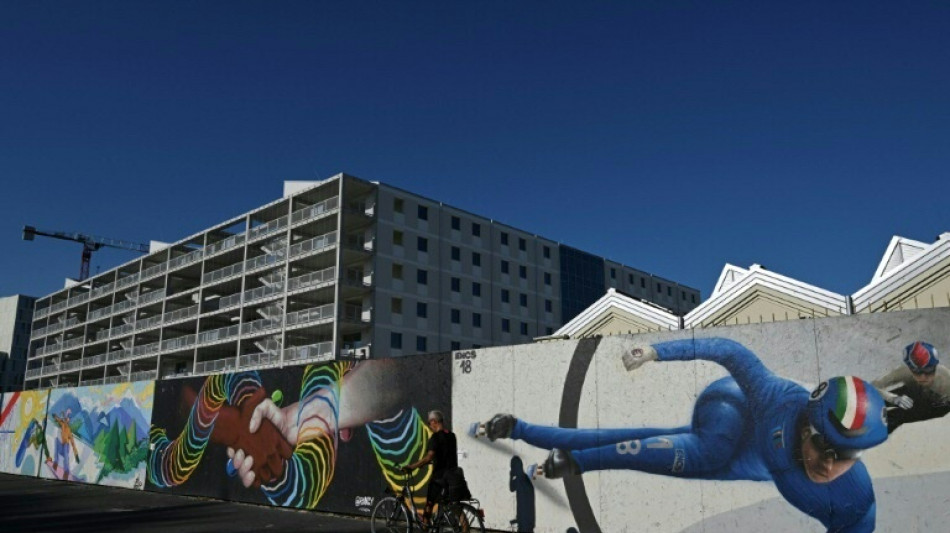
BCC
1.8600

Six months before the start of the Winter Olympics, Italian organisers say that, after years of ups and downs, they are on schedule.
"Preparations are progressing steadily and according to the timeline we have set," Andrea Varnier, the chief executive officer of Milan-Cortina 2026 Olympic and Paralympic Organising Committee, told AFP.
The Olympic opening ceremony is on February 6, though curling kicks off the action two days earlier. The Paralympics open a month later on March 6, though curling again breaks the ice two days beforehand.
"We are currently in the core phase of operational implementation," said Varnier.
Simico, the public company responsible for delivering the Olympic facilities, last week promised that "all the planned sports construction projects will be completed before the start of the Olympics".
Organisers have made a point of delivering a low-cost Winter games after recent extravangances.
Sochi, in Russia in 2014, cost at least $40 billion (34.5 bn euros at current exchange rates). Pyeongchang, in South Korea in 2018, came in at over $12 bn. The Covid-hit Games in Beijing in 2022 officially cost $4 bn, but financial analysts said that including infrastructure costs put the total at around $38bn.
Milan-Cortina estimate their final bill will be 5.2 bn euros ($6 bn). Of that 3.5 bn euros is going on infrastructure and 1.7 bn euros on staging the Games.
The Games are using a host of existing venues - emphasising the point by holding the closing ceremony in the almost 2,000-year-old Roman amphitheatre in Verona. Organisers say that avoiding new construction reduces not only costs but environmental impact.
- 'Compex global event' -
This approach also means the Games will stretch across northern Italy from Cortina in the Dolomites in the east 350 kilometres to the western suburbs of Milan, with other "clusters" spread through the Alps.
"As with any complex global event, challenges are part of the process," said Varnier. "We are moving forward with confidence."
One of the few new venues will be briefly the Milano Santa Giulia Ice Hockey Arena before assuming its intended role as the multi-purpose Eventim Arena after the Games.
While organisers have managed to avoid being lumbered with a little-used speed-skating track by temporarily converting two exhibition halls at the Milan fair grounds, another group of sports with few participants created a political and construction headache.
Because Italy did not have a track for the bobsleigh, luge, and skeleton events, organisers considered using existing sites in Austria or Switzerland.
Matteo Salvini, the second-in-command and Minister of Transport in Giorgia Meloni's hard-right government, insisted in late 2023 that the events be held in Italy.
That meant a breakneck race to build a track in Cortina. It was completed just in time for pre-approval in March.
Accommodation, which often poses a logistical and financial problem for Olympic organisers, seems to be locked up.
The Milan Village, six seven-storey buildings to be converted into university dorms after the Games, will be delivered in "early October" despite the recent legal troubles of its developer, the Coima group.
In Cortina, 377 prefabricated modules will be installed by the end of October.
- 'We'll be ready' -
While it is not clear if Italy's ski star Federica Brignone, who won the overall World Cup and a world title last season but smashed her left leg, will be fit to compete, the organisers revealed in July the design of the medals she would be chasing.
They will weigh 420 grams in bronze and 500 grams in gold and in silver.
The designer promised the medals will endure better than a few of those from last year's Paris Games. Some 220 medals, which contained a small piece of scrap metal from the Eiffel Tower, had to be replaced because they quickly turned black or rusted.
"We cannot allow what happened in Paris to happen again," said their designer Raffaella Panie.
That leaves just one unknown. The Italian meteorological service, contacted by AFP, said it was unable to predict whether there would be enough snow next February.
The organisers said they were not worried.
"We'll be ready," they said.
T.Musil--TPP